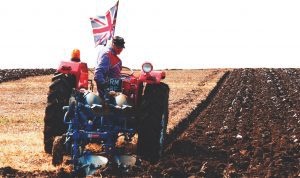- UK should unilaterally remove tariffs on food after Brexit to cut prices for consumers
- A British Agriculture Policy should be focused on delivering public goods, not on subsidising large landowners
 Farming Tomorrow, a major new report from Policy Exchange, sets out the once in a generation chance we have to reform Britain’s environmental policy and approach to farming after Brexit.
Farming Tomorrow, a major new report from Policy Exchange, sets out the once in a generation chance we have to reform Britain’s environmental policy and approach to farming after Brexit.
The Common Agricultural Policy has, at great expense, reduced agricultural productivity by lessening competition and supporting inefficient farmers, and increased costs for consumers. Outside the EU, the UK will be free to abolish tariffs on food products, which will unlock new trade deals, help developing countries and deliver cheaper food for consumers. We can also reform the agricultural subsidies regime so that we reward farmers who deliver public goods like biodiversity and flood prevention, rather than rewarding wealthy landowners.
Policy Exchange recommends that:
- After leaving the EU Customs Union, the UK should unilaterally phase out tariffs that increase consumer food prices and complicate new trade deals.
- The UK should replace the CAP with a new British Agricultural Policy which focuses on payments for ecosystem services (or natural capital) and phases out production subsidies and income support by 2025. Any remaining subsidies should be redirected towards protection for natural and public goods, and increasing R&D to boost innovation and the sector’s long-term productivity.
- Government should ensure that its Industrial Strategy reflects the needs of the rural economy, and should redirect some agricultural subsidies towards rural infrastructure and connectivity and agricultural R&D.
- We should review and reform EU rules such as the crop diversification rule and transpose key environmental directives to ensure continuity of protection for the environment.
- The Food Safety Agency should be given new powers to collate, commission, and review scientific evidence on food safety and animal welfare.
Policy Exchange’s Director of Research Warwick Lightfoot, who co-wrote the report, says
“The primary goal of government intervention in agriculture should be to support public goods, and to preserve high standards for environmental protection, food safety, and animal welfare. But while we are in the EU, 87% of UK farming income comes from subsidies, a perverse and unsustainable state of affairs.
“Leaving the European Union allows us to think again about agricultural policy from first principles. The starting point for policy reform must be the consumer. The EU’s historic reluctance to open up trade in food products has repeatedly stymied trade deals and led to higher prices for consumers and a distorted farming industry. The UK can now lead the world in cutting tariffs and being a champion of free trade in agriculture.
“Reform of the CAP also offers a once in a generation chance to reform Britain’s environmental policy, and ensure that we leave the environment better than we found it. For the first time in over 40 years, we can have a proper land management policy which balances agriculture with other land uses like forestry: outside the EU we can plant more trees.”

